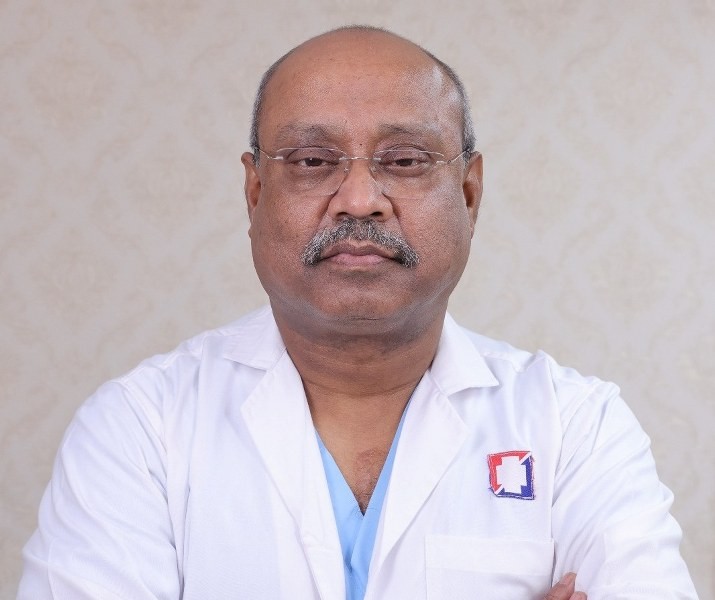 Kolkata
Kolkata
Kolkata: 32-year-old Bhutanese man undergoes complex surgical management of multiple Enteroanastomotic Fistula repair in Peerless Hospital
Kolkata doctor successfully conducted complex surgical management of multiple Enteroanastomotic Fistula repair of a 32-year-old Bhutanese man in Kolkata’s Peerless Hospital.
The surgery was conducted by Dr. Sibnath Mandal.
Rinzin Dorji was admitted to Peerless Hospital on March 2, 2024 following a referral from JDWNR Hospital in Bhutan.
He had previously been diagnosed with intra-abdominal sepsis secondary to a gastrointestinal perforation.
Dorji had a complex surgical history, including gastrojejunostomy at the age of 12 and Graham's patch repair for a duodenal perforation in 2017.
His current admission followed the development of multiple enterocutaneous fistulas with bile leak, secondary to multiple previous surgeries.
Upon admission, Dorji was in critical condition and was immediately transferred to the Intensive Care Unit (ICU), where he was placed on ventilator support and received Total Parenteral Nutrition (TPN).
Initial imaging and lab results revealed significant complications, including low hemoglobin (8.3), low potassium levels (2.6), and elevated C-reactive protein (CRP 177), indicating an ongoing inflammatory process. Urine analysis revealed the presence of pus cells, bilirubin, and occult blood, further complicating his clinical picture.
Dorji underwent an emergency exploratory laparotomy with abdominal washout and creation of a new feeding jejunostomy on March 4, 2024.
Intraoperative findings revealed a large gastrostomy wound with liquid stool and extensive bowel adhesions. The surgical team performed a thorough washout and left the wound open for further management.
Post-operatively, he was closely monitored in the ICU and showed gradual hemodynamic stabilization, though he required continued TPN and vigilant care due to ongoing complications, including a mild left-sided pleural effusion noted on chest X-ray.
Despite initial post-operative management, Dorji's condition necessitated a second surgical intervention on April 27, 2024.
This surgery involved gastroscopy, enteroscopy, primary repair of multiple small bowel fistulas, adhesiolysis, and abdominal closure.
Intraoperative findings included five distinct fistulas along the small bowel and a leaking gastrojejunostomy.
The surgical team successfully repaired all identified fistulas, performed thorough abdominal washout, and closed the abdomen using advanced techniques.
Post-operatively, Dorji again required intensive monitoring and supportive care, including multiple blood and plasma transfusions due to ongoing anemia and low protein levels.
Persistent complications, including a leak from the previous surgical site, necessitated a third exploratory laparotomy on May 7, 2024.
Intraoperative findings showed dirty pus mixed with fluid inside the abdomen, along with a bile leak. The surgical team repaired the leaks, performed another thorough washout, and placed drains for continued monitoring.
Dorji remained in the ICU for several days post-operatively, receiving further blood transfusions, electrolyte correction, and TPN.
Over the following weeks, Dorji's condition gradually improved. By mid-June 2024, he was able to tolerate oral intake and was weaned off TPN.
His wounds showed signs of healing, and he was transitioned to a high-protein, low-residue soft diet.
By late June, Dorji was tolerating a normal diet, and his feeding jejunostomy tube was removed.
Throughout his hospital stay, Dorji required a total of nine units of packed red blood cells and 20 units of fresh frozen plasma.
Dorji was discharged on June 30, 2024, in a stable condition. At the time of discharge, he was ambulatory, afebrile, and tolerating a normal diet.
His bowel function had normalized, and he was advised to follow a high-protein diet to support continued recovery.
Medications prescribed at discharge included Pantocid, A to Z Gold capsules, Parasafe for pain management, Shelcal, Movicol for constipation, and Polybion LC syrup.
The management of Rinzin Dorji's case highlights the complexities and challenges associated with multiple enterocutaneous fistulas and abdominal wound dehiscence in a patient with a history of multiple abdominal surgeries.
Through a series of surgical interventions and intensive post-operative care, the patient was able to recover and achieve a stable condition, underscoring the importance of a multidisciplinary approach in managing such critical cases.
Top Headlines
-
Health
Diabetes, muscle loss and the illusion of quick fixes: Why lifestyle correctionnot shortcutsremains our strongest medicine
February 18, 2026
-
Health
Kolkata: Rotary Club of Calcutta Pointers, Indian Cancer Society host cancer awareness, screening camp
February 17, 2026
-
Health
Akhil Bharat Jaiguru Sampradaya and Omkarnath Mission volunteers care for terminally ill patients at Mahamilan Math hospice
November 05, 2025
-
Health
Ayurveda and Skin Health in the Modern Age
October 09, 2025
-
Health
MedSage expands footprint with new branch in Rampurhat
October 04, 2025
-
Health
Vijaya Diagnostic Centre inaugurates State-of-the-Art Centre featuring first advanced 3 Tesla MRI in Kolkata
September 11, 2025
-
Health
Ayurveda and the urban woman: Practical science for a healthier, calmer life
September 07, 2025
-
Health
Rotary Club of Belur strengthens Kolkata healthcare with donation to Ramkrishna Mission Seva Pratishthan
August 25, 2025
-
Health
Parampara Ayurveda founder Dr. Debabrata Sen shares wellness strategies for desk-bound professionals
August 08, 2025
-
Health
Kolkata: Mega health camp transforms lives in Ultadanga slum with free multi-specialty services
August 02, 2025
